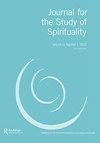Spiritual care training needs in hospice palliative care settings in South Africa: Chorused national, provincial and local voices
IF 0.7
0 RELIGION
引用次数: 0
Abstract
ABSTRACT Globally, spiritual care is recognized as an important component of palliative care. In the Global North spiritual care training is gaining momentum and being prioritized, but not so in the Global South. This study seeks to establish what the national spiritual care training needs are in hospice palliative care settings with formalized spiritual care services in a middle-income country in the Global South. This was a three-part study: a quantitative national online survey of hospices in South Africa establishing what their spiritual care training needs were – survey results were collated, analyzed and filtered for key issues and overarching themes; a qualitative study consisting of focus group discussions with hospices in the Western Cape Province, South Africa, who have formalized spiritual care services, with the aim of understanding their spiritual care practices and workforce needs – the discussions were analyzed using thematic analysis; and a qualitative study drawing on the experiences of a cohort of spiritual care workers from an established hospice in Cape Town to understand their training needs in spiritual care and explore their workforce issues. Results revealed a chorused need for the development of a national training curriculum in spiritual care for hospices providing palliative care in South Africa and a chorused recognition that spiritual care services are nuanced and require both formalization and flexibility for spiritual care workers to be led by patient needs. Two elements – finance and human capital – were identified as key barriers to developing a spiritual care curriculum.南非临终关怀姑息治疗环境中的精神护理培训需求:国家、省和地方的一致声音
摘要在全球范围内,精神护理被公认为姑息治疗的重要组成部分。在全球北方,精神护理培训正在获得势头,并被列为优先事项,但在全球南方却并非如此。本研究旨在确定全球南方一个中等收入国家在临终关怀姑息治疗环境中的国家精神护理培训需求,并提供正式的精神护理服务。这是一项由三部分组成的研究:一项针对南非临终关怀院的定量全国在线调查,确定了他们的精神护理培训需求——对调查结果进行了整理、分析和筛选,以确定关键问题和总体主题;一项定性研究,包括与南非西开普省的收容所进行焦点小组讨论,这些收容所已正式提供精神护理服务,目的是了解他们的精神护理实践和劳动力需求——使用主题分析对讨论进行了分析;以及一项定性研究,该研究借鉴了开普敦一家知名临终关怀机构的精神护理工作者的经验,以了解他们在精神护理方面的培训需求,并探讨他们的劳动力问题。结果显示,人们一致需要为南非提供姑息治疗的临终关怀院制定国家精神护理培训课程,并一致认识到精神护理服务是细致入微的,需要形式化和灵活性,让精神护理工作者以患者需求为主导。财务和人力资本这两个要素被确定为开发精神护理课程的关键障碍。
本文章由计算机程序翻译,如有差异,请以英文原文为准。
求助全文
约1分钟内获得全文
求助全文
来源期刊

Journal for the Study of Spirituality
RELIGION-
CiteScore
2.50
自引率
7.10%
发文量
25
期刊介绍:
Journal for the Study of Spirituality is a peer-reviewed journal which creates a unique interdisciplinary, inter-professional and cross-cultural forum where researchers, scholars and others engaged in the study and practices of spirituality can share and debate the research, knowledge, wisdom and insight associated with spirituality and contemporary spirituality studies. The British Association for the Study of Spirituality (BASS) organises a biennial international conference and welcomes enquiries about membership from those interested in the study of spirituality in the UK and worldwide. The journal is concerned with what spirituality means, and how it is expressed, in individuals’ lives and communities and in professional practice settings; and with the impact and implications of spirituality in, and on, social policy, organizational practices and personal and professional development. The journal recognises that spirituality and spiritual values can be expressed and studied in secular contexts, including in scientific and professional practice settings, as well as within faith and wisdom traditions. Thus, Journal for the Study of Spirituality particularly welcomes contributions that: identify new agendas for research into spirituality within and across subject disciplines and professions; explore different epistemological and methodological approaches to the study of spirituality; introduce comparative perspectives and insights drawn from different cultures and/or professional practice settings; aim to apply and develop sustained reflection, investigation and critique in relation to spirituality and spiritual practices; critically examine the values and presuppositions underpinning different forms of spirituality and spiritual practices; incorporate different forms of writing and expressions of spirituality.
 求助内容:
求助内容: 应助结果提醒方式:
应助结果提醒方式:


